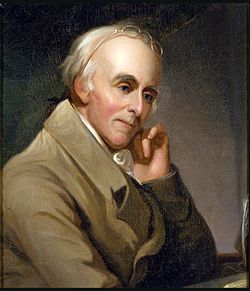Benjamin Rush
American physician, educator, and author (1746-1813) From Wikipedia, the free encyclopedia
Remove ads
Benjamin Rush (January 4, 1746 [O.S. December 24, 1745] – April 19, 1813) was an American politician. He was one of the signers of the Declaration of Independence. He was a leader in the Philadelphia community. Rush was also a physician, social reformer, humanitarian and educator. He founded Dickinson College. He was a professor of medicine and chemistry at the University of Pennsylvania. Rush was also the surgeon general of the Continental Army.[1][2]
Remove ads
Early life
Rush was born in Philadelphia on Jan. 4, 1746. He grew up in Philadelphia and went to college at the College of New Jersey (now Princeton University). He did a medical training in Europe. He got a medical degree from the University of Edinburgh. Rush returned to the American colonies. He became a professor at the College of Philadelphia (now University of Pennsylvania). Rush had a medical practice and rescued the American Philosophical Society.[3] His publications include the first American chemistry textbook.[4]
Remove ads
Revolutionary era
Rush was politically active. He was part of the Sons of Liberty. He advised Thomas Paine, who wrote Common Sense. Rush signed the Declaration of Independence. He represented Philadelphia at the Constitutional Convention.[5]
Rush also gave medical help in battles of the American Revolutionary War. Rush gave directions to keep soldiers healthy. The American military used these guidelines until 1908.[6] However, there was also controversy. Rush sent two letters criticizing George Washington. Rush wrote that the armies were disorderly under Washington. Rush resigned in 1778 and later regretted his letters.[4]
Remove ads
Later life
After the Revolutionary War, Rush worked at the Pennsylvania Hospital. Rush was the treasurer of the United States Mint from 1797 to 1813. He became a fellow of the American Academy of Arts and Sciences in 1788.[5] Rush returned to the University of Pennsylvania as a professor of medicine. William Henry Harrison was a student of Rush. Rush founded Dickinson College in 1773. Rush treated patients during the 1793 Philadelphia yellow fever epidemic. He was also one of the founders of the Pennsylvania Prison Society.[7] Rush prepared Meriwether Lewis for the medical part of the Lewis and Clark Expedition.[8]
Reforms
Rush was a reformer in many ways. He opposed slavery. He spoke out against the slave trade. He argued that African-Americans and Europeans were equal.[9] He also opposed the death penalty and capital punishment. He believed punishment for criminals should be private. He said the death penalty went against reason and happiness.[10] Rush also supported women's education. He founded the Young Ladies' Academy of Philadelphia. He helped contribute to the ideals of the Republican Motherood.[11]
Remove ads
Medicine
Medicine at the time was not as advanced. Rush supported heroic medicine. This included things like bloodletting.[12] People criticized Rush for this. It is now known to be dangerous. Rush also wrote case reports on infectious diseases like dengue fever.[13] Rush believed that blackness was a curable skin disease.[14] Today, this is considered false and wrong. Rush studied Native American health and why they got certain diseases.[15] Rush also did a lot with mental health. He used mercury for mental problems. He developed occupational therapy and classified mental disorders. Rush treated addiction like a medical condition and not a sin. At the time, people had bad views about mentally sick people. Rush, however, said that mentally ill people were not inhuman animals.[16][17]
Remove ads
Death
Rush died of typhus fever in 1813. He was buried at Christ Church burial in Philadelphia.
References
Wikiwand - on
Seamless Wikipedia browsing. On steroids.
Remove ads

